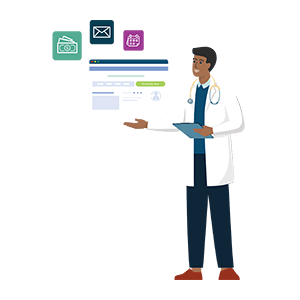Healthcare Scheduling Software: What Medical Practices & Physicians Should Know

By Chloe From Clearwave | October 20, 2025
The question isn’t whether patients want digital scheduling options; it’s whether your practice can afford to operate without them.
Imagine a potential patient researching providers online at 9 PM after putting their children to bed. They find your practice, read positive reviews and feel confident about booking an appointment, only to discover they must call during business hours to schedule. Frustrated, they move on to the next provider who offers instant online booking.
This scenario plays out thousands of times daily across healthcare markets, illustrating how scheduling friction can silently erode practice growth.
Keep reading to discover why patients now prefer providers with online scheduling capabilities, how outdated booking systems are costing practices both revenue and patient loyalty. See what medical providers need to know to drive practice growth.
Why Self-Scheduling is a Non-Negotiable
Patients now approach healthcare with the same digital expectations they have for every other service industry. When they can book flights, restaurant reservations and ride-shares with a few taps on their smartphone. Being forced to make appointments during business hours feels antiquated and frustrating.
The data paints a clear picture of patient preferences. Studies indicate that 61% of patients abandon the booking process entirely when faced with challenges like being redirected to make a phone call instead of completing their appointment request online. This abandonment rate represents lost revenue and missed opportunities for practices that haven’t adapted to digital scheduling solutions.
The demographic breakdown reveals that this preference isn’t just generational — 99% of Millennials would use online scheduling if offered, 97% of Gen X patients and 92% of Baby Boomers express the same preference. These statistics demonstrate that increasing patient volume in a medical office requires addressing scheduling accessibility across all age groups.
Perhaps most concerning for practice administrators is the finding that 87% of patients report that access to scheduling is getting worse as staffing shortages hinder operational efficiency. This shift creates a compounding problem where practices struggling with staff retention simultaneously face decreased patient satisfaction and potential patient loss.
What Are the Common Concerns Healthcare Providers Have About Digital Scheduling?
Despite overwhelming patient demand, many healthcare providers remain hesitant to implement comprehensive scheduling software. Understanding these concerns is crucial for making informed decisions about practice technology investments.
Will Our Complex Booking Workflows Transfer to Digital Systems?
Many providers worry that their specialized scheduling requirements are too complex for automated systems. Concerns about appointment type restrictions, provider-specific protocols and location-based scheduling logic often fuel resistance to digital solutions. However, modern healthcare scheduling platforms are designed with sophisticated workflow capabilities that can replicate and often improve upon manual processes.
Leaders in complex specialties, like orthopedics, are already using online scheduling to drop call center training times and improve booking accuracy.
Andrew Vieira, Vice President of Clinical Applications at Spire, highlights the organization’s mission, “Orthopedics is a complex specialty with many nuances and sub-specialties within it. Each requires its own set of unique skills and the call center’s ability to match the appropriate specialist to the patient’s problem is a complex process.”
Going on, he shares how digital tools have met their needs, “Clearwave Call Center has helped us bridge this gap and provide the level of care we seek to achieve at Spire. Clearwave’s flexibility, customizations and understanding of our needs as an organization to provide such care has been essential to the success of our partnership with them.”
Does Online Booking Really Increase Accuracy?
Contrary to common assumptions, digital scheduling systems often provide greater accuracy than manual processes. Pre-determined digital workflows eliminate human error possibilities that exist in phone-based scheduling. As one practice director noted, online bookings ensure accuracy that isn’t always guaranteed in phone interactions, where miscommunication and manual entry errors can occur.
As Jennifer Lott, Director of Operations at The Orthopaedic Group, explains: “When patients book with Clearwave, we know it will be accurate, which isn’t something you can always guarantee in an over-the-phone interaction.”
Going on, she notes how this eliminates the frustration of rebooking: “We have not heard any issues of patients getting into the schedule that should not have been booked. I have found that the patient base using this scheduling feature are just the right kind of patients that we want to get on our calendar. ”
How Do Digital Tools Handle Insurance Verification and Complex Requirements?
Advanced scheduling software now incorporates automated eligibility checks and intelligent routing logic. These systems can verify insurance coverage, direct patients to appropriate appointment types based on their coverage, and even present financial policy acknowledgments for uninsured patients during the booking process.
Lott again explains how this works in practice: “Clearwave was able to add a pop-up consent in our scheduling workflows. Now, when someone indicates that they’re uninsured, we can have patients review and acknowledge our financial policies via the online scheduler.”
This capability ensures that both insurance verification and financial acknowledgments are handled seamlessly during the booking process, reducing administrative burden while maintaining compliance requirements.
Will Online Scheduling Impact Our Emergency and Urgent Care Capacity?
Smart scheduling logic can be configured to reserve specific time slots for urgent appointments while still maximizing self-scheduled bookings. Practices can designate certain openings for walk-ins or same-day needs while allowing routine appointments to be booked online, creating an optimal balance between efficiency and accessibility.
As Noitavia Fitts, Senior Manager of Patient Experience at Thomas Eye Group, shares: “What truly helped us was the ability to customize the self-scheduling platform. The customization of our scheduling workflows helped us stay competitive in the market and alleviate staff burdens around scheduling management.”
Additionally, when patients can easily book, reschedule and cancel appointments online, no-show rates typically decrease — saving spots in your calendar that need to be refilled. Consider adding a waitlist to your scheduling approach to further enable patients to book last-minute openings. When patients can automatically be notified of earlier appointment openings, medical practices can optimize their schedules and reduce gaps caused by cancellations. This automated approach often fills appointments more efficiently than manual callback systems.
I’ve Tried Online Scheduling Before, and It Doesn’t Work for Our Medical Practice
Not all online scheduling tools are one in the same, and many practices have been burned before by digital solutions that simply can’t keep up.
Connie Roberts, Chief Operating Officer at the Center for Sports Medicine & Orthopaedics, shared some of the complexities they originally faced with a previous tool. She notes, “That convenience factor we had given patients was taken away when our previous solution wouldn’t map patients to the appropriate bookings. It didn’t allow us to set the binders and rules we needed. Patients would book their appointments and plan accordingly, just for our team to call them and redo the process. That was a critical piece and what led us to look at Clearwave as a new vendor.”
Of their experience with Clearwave, Roberts says, “The time spent backtracking and calling patients to reschedule has significantly reduced from our previous solution. With Clearwave, we now focus on opportunities to tighten our workflows or expand to new appointment types. We’re making a very strong scheduling product just a little bit stronger every day.” Consider the ripple effects of scheduling efficiency when looking for the right scheduling solution.
Make Medical Scheduling Tools Work For Your Practice
Debunk myths around online scheduling today. After all, patient retention improves when scheduling friction is eliminated. Practices that force patients to call during business hours for modifications create unnecessary barriers that may drive patients to seek care elsewhere. Self-service scheduling that operates 24/7 accommodates patients’ varied schedules and work demands, making it easier for them to maintain consistent care relationships.
Ready to see how leading practices successfully balance patient convenience with provider requirements? Watch this conversation with a provider who shares proven strategies for implementing self-scheduling that work for both patients and doctors.




